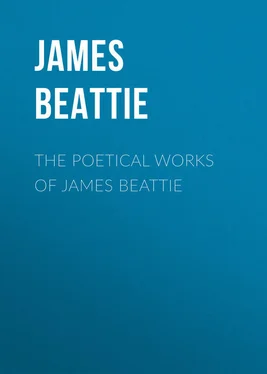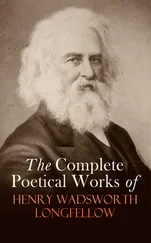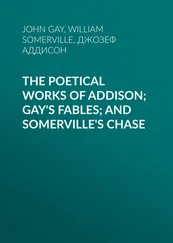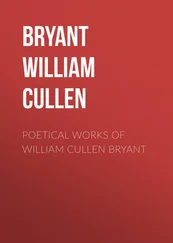James Beattie - The Poetical Works of James Beattie
Здесь есть возможность читать онлайн «James Beattie - The Poetical Works of James Beattie» — ознакомительный отрывок электронной книги совершенно бесплатно, а после прочтения отрывка купить полную версию. В некоторых случаях можно слушать аудио, скачать через торрент в формате fb2 и присутствует краткое содержание. ISBN: , Жанр: foreign_antique, foreign_prose, foreign_poetry, на английском языке. Описание произведения, (предисловие) а так же отзывы посетителей доступны на портале библиотеки ЛибКат.
- Название:The Poetical Works of James Beattie
- Автор:
- Жанр:
- Год:неизвестен
- ISBN:http://www.gutenberg.org/ebooks/41760
- Рейтинг книги:5 / 5. Голосов: 1
-
Избранное:Добавить в избранное
- Отзывы:
-
Ваша оценка:
- 100
- 1
- 2
- 3
- 4
- 5
The Poetical Works of James Beattie: краткое содержание, описание и аннотация
Предлагаем к чтению аннотацию, описание, краткое содержание или предисловие (зависит от того, что написал сам автор книги «The Poetical Works of James Beattie»). Если вы не нашли необходимую информацию о книге — напишите в комментариях, мы постараемся отыскать её.
The Poetical Works of James Beattie — читать онлайн ознакомительный отрывок
Ниже представлен текст книги, разбитый по страницам. Система сохранения места последней прочитанной страницы, позволяет с удобством читать онлайн бесплатно книгу «The Poetical Works of James Beattie», без необходимости каждый раз заново искать на чём Вы остановились. Поставьте закладку, и сможете в любой момент перейти на страницу, на которой закончили чтение.
Интервал:
Закладка:
At this time, Sir Joshua Reynolds, having requested Beattie to sit for his picture, produced a likeness of him, which is generally regarded as one of the finest works of that admirable artist. He is represented in his Oxford gown of Doctor of Laws, with his famous Essay under his arm; while beside him is Truth, habited as an Angel, holding in one hand a pair of scales, and with the other thrusting down three frightful figures, emblematic of Prejudice, Scepticism, and Folly. 18Of this picture Sir Joshua made a present to Beattie, who set a due value on so noble a composition, and preserved it with the utmost care.
After an absence of a little more than five months, he returned to Aberdeen.
A striking proof how highly the character and talents of Beattie were appreciated, even by those to whom he was personally unknown, occurred in October of this year (1773), when the chair of Moral Philosophy in the University of Edinburgh was offered to him by the electors, the magistrates of the city. He, however, declined accepting it, "Though my fortune" (he writes to Sir William Forbes, on the subject) "were as narrow now as it lately was, I should still incline rather to remain in quiet where I am, than, by becoming a member of the University of Edinburgh, to place myself within the reach of those (few as they are) who have been pleased to let the world know that they do not wish me well." He alludes to the enemies whom his Essay on Truth had raised up.
The Second Book of The Minstrel , together with a new and corrected edition of the First, appeared in 1774, the author's name being now added. The poem, thus enlarged, suffered no diminution of its popularity.
The following year, Beattie and his wife spent several weeks in London, residing during the chief part of the time with Dr. Porteus, one of his kindest and most zealous friends. On this occasion, having shown himself at court, he was immediately recognized by the King, who spoke to him very graciously, and made several inquiries concerning his studies.
To a new and improved edition in quarto, of the Essay on Truth , printed by subscription, 19in 1776, our author appended three other Essays: On Poetry and Music, as they affect the Mind , On Laughter and Ludicrous Composition , and On the Utility of Classical Learning . In 1777, 20he gave to the press a new edition of The Minstrel , to which he added a few of his minor poems: this volume (he says in the preface) contains "all the verses of which I am willing to be considered as the author." In 1778, 21he printed for private circulation a Letter to Dr. Blair, on the improvement of Psalmody in Scotland . In 1779, he published, for the use of the young men who attended his Lectures, a List of Scotticisms , to the amount of about two hundred. And in 1780, he contributed some thoughts On Dreaming to the well known periodical paper, The Mirror .
The following portion of a letter from Dr. Johnson to Beattie shows how sincerely our author was esteemed by the great moralist:
"Bolt Court, Fleet Street, 21st August, 1780."More years than I have any delight to reckon have past since you and I saw one another. Of this, however, there is no reason for making any reprehensory complaint, sic fata ferunt : but, methinks, there might pass some small interchange of regard between us. If you say that I ought to have written, I now write; and I write to tell you, that I have much kindness for you and Mrs. Beattie, and that I wish your health better, and your life long. Try change of air, and come a few degrees southward; a softer climate may do you both good. Winter is coming on, and London will be warmer, and gayer, and busier, and more fertile of amusement than Aberdeen."
In 1781, Beattie made another journey to London, taking with him his eldest son, James Hay Beattie. 22While there, we find him writing thus to Sir William Forbes:
"1st June."I have been visiting all my friends again and again, and found them as affectionate and attentive as ever. Death has indeed deprived me of some since I was last here, of Garrick, and Armstrong, and poor Harry Smith; but I have still many left."… "Johnson grows in grace as he grows in years. He not only has better health and a fresher complexion than ever he had before (at least since I knew him), but he has contracted a gentleness of manners which pleases every body."
"28th June."I thought it my duty to appear at the levee before I left London; and accordingly the week before last I went to court. The king had not seen me for six years, and yet, to my surprise, knew me at first sight. He spoke to me with his wonted condescension and affability; and paid me a very polite compliment on the subject of my writings."
His Dissertations, Moral and Critical , were published in 1783.
A passage from a letter of the poet Cowper to the Rev. William Unwin, 5th April, 1784, 23must not be omitted here:
"If you have not his poem, called the 'The Minstrel,' and cannot borrow it, I must beg you to buy it for me; for, though I cannot afford to deal largely in so expensive a commodity as books, I must afford to purchase at least the poetical works of Beattie."
His health impaired, and his peace of mind destroyed, by the melancholy condition of his wife (who, labouring under confirmed insanity, was now removed from her family), we need not wonder that Beattie should endeavour to forget his domestic griefs in the society of his English friends, to whom he was ever welcome. During the year 1784, after passing some time in London, he spent a month with Dr. Porteus (who had now attained the rank of Bishop of Chester), at the beautiful parsonage of Hunton, near Maidstone, which he characterizes as "the mansion of peace, piety, and cheerfulness." He also visited Mrs. Montagu, at her seat, called Sandleford, in Berks.
In 1786, his Evidences of the Christian Religion , were published. A remark which he makes in a letter, while engaged in the composition of this judicious summary, is worth quoting: "Whether this work shall ever be of use to others, I know not; but this I know, that it has been of considerable benefit to myself. For though, when I entered upon it, I understood my subject well enough to entertain no doubt of the goodness of my cause, yet I find, as I advance, new light continually breaking in upon me."
The receipt of the following letter could hardly fail to gratify our author:
"Philadelphia, 1st August, 1786."The American revolution, which divided the British empire, made no breach in the republic of letters. As a proof of this, a stranger to your person, and a citizen of a country lately hostile to yours, has expressed his obligations to you for the knowledge and pleasure he has derived from your excellent writings by procuring your admission into the American Philosophical Society; a certificate of which, subscribed by our illustrious president, Dr. Franklin, and the other officers of the society, you will receive by the next vessel that sails to any port in North Britain from this city.
"The stranger alluded to finished his studies in medicine in Edinburgh in the year 1769, and has ever since taught chemistry and medicine in the college of Philadelphia. His name (with the greatest respect for yours) is,
"Benjamin Rush."The next year, with his eldest son for his companion, he repaired again to London. While there, he writes thus to his niece, Miss Valentine, now Mrs. Glennie:
"London, 20th July, 1787."I am just returned from Windsor, where I passed three days. I went thither, partly to see some friends, but chiefly that I might pay my respects to the King and Queen. They both received me in the most gracious manner. I saw the King first on the terrace, where he knew me at first sight, and did me the honour to converse with me a considerable time. Next morning I saw him again at prayers in his chapel, where he was pleased to introduce me to the Queen, who inquired very kindly after my health; observed, that many years had passed since she saw me last; regretted the bad weather which I had met with at Windsor (for it rained incessantly,) which, said she, has made your friends see less of you than they wished; and, after some other conversation, her Majesty and the Princess Elizabeth, who attended her, made a slight courtesy, and stepped into the carriage that waited for them at the chapel door. The King remained with us for some time longer, and talked of various matters."
Читать дальшеИнтервал:
Закладка:
Похожие книги на «The Poetical Works of James Beattie»
Представляем Вашему вниманию похожие книги на «The Poetical Works of James Beattie» списком для выбора. Мы отобрали схожую по названию и смыслу литературу в надежде предоставить читателям больше вариантов отыскать новые, интересные, ещё непрочитанные произведения.
Обсуждение, отзывы о книге «The Poetical Works of James Beattie» и просто собственные мнения читателей. Оставьте ваши комментарии, напишите, что Вы думаете о произведении, его смысле или главных героях. Укажите что конкретно понравилось, а что нет, и почему Вы так считаете.












